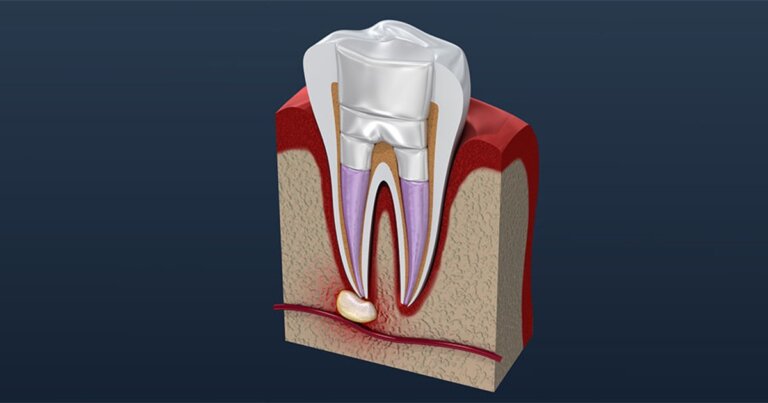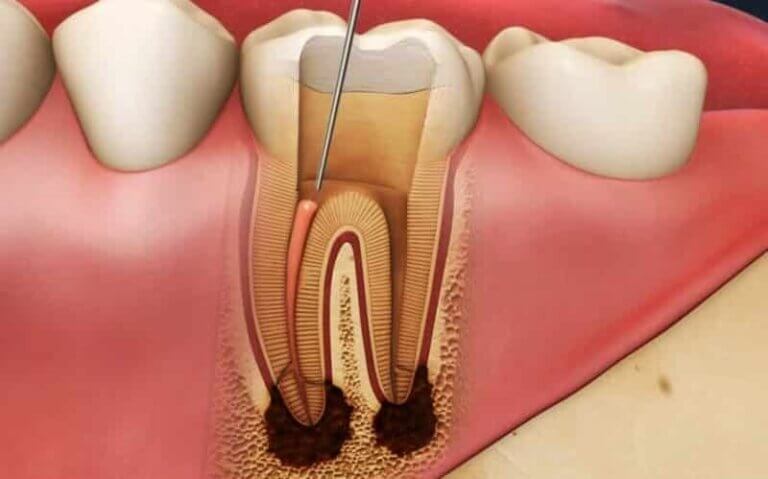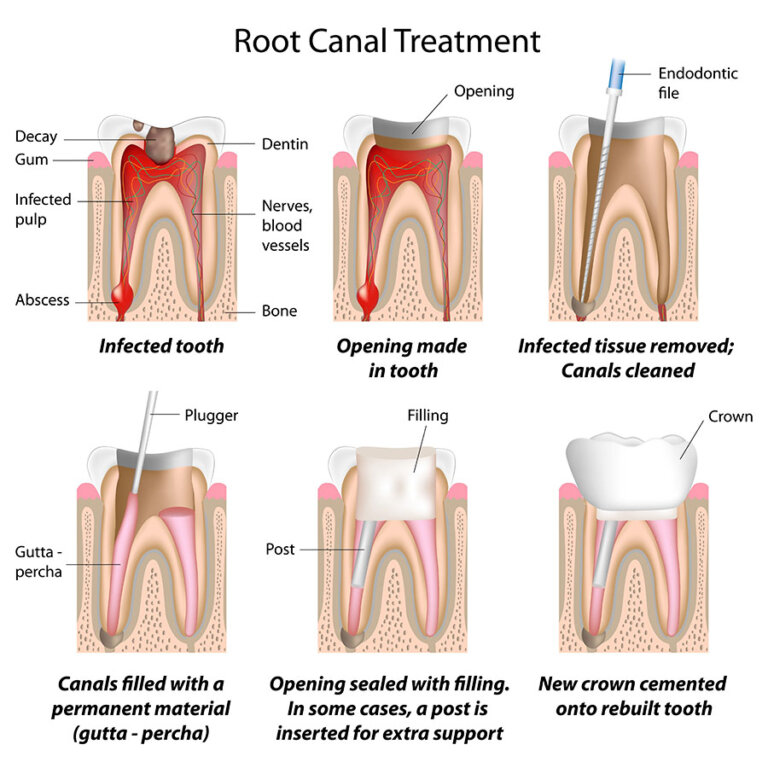Root Canal Treatment

What Is Root Canal Treatment?
Root canal treatment, also known as endodontic therapy, is a dental procedure designed to save a tooth that is severely damaged or infected. By removing the infected pulp from inside the tooth, the procedure preserves the natural tooth and alleviates pain, helping you avoid tooth extraction.
Each tooth has a soft inner tissue called dental pulp, which houses blood vessels and nerves. When this pulp becomes infected due to deep decay, trauma, or cracks in the tooth, bacteria can spread, causing severe pain and potential infection. Root canal therapy is a highly effective solution to remove the infection, restore the tooth, and prevent further complications.
Thanks to modern dental technology, root canal procedures are generally painless and can often be performed in a single visit. Before you deciding on whether Root Canal Treatment are right for you, there are some things you should know:
- Who Needs Root Canal Treatment?
- Benefits Of Root Canal Treatment
- Alternative Treatments To Root Canal Treatment
- How Much Does Root Canal Treatment Cost?
- Steps In The Root Canal Treatment Procedure
- Frequently Asked Questions About Root Canal Treatment
If you have any further questions about Root Canal Treatment or other dental services offered at Atlas Dental, please contact us.

Free phone consultation
Have questions about root canal treatment? Schedule a free phone consultation with our Toronto dentist.

5 star google reviews
See for yourself why more and more people are choosing our dental office for root canal treatment.

Emergency dental care
Have a toothache in Toronto and think you need root canal treatment? Book online for same day exam and treatment.
Who Needs Root Canal Treatment?
Root canal treatment is necessary when the dental pulp becomes infected, inflamed, or damaged. Common causes for root canal therapy include:
- Severe Tooth Decay: Deep decay that reaches the pulp can cause infection and pain.
- Dental Trauma: A significant blow to the tooth from a fall or accident may damage the pulp.
- Cracked or Fractured Teeth: Cracks can allow bacteria to enter and infect the pulp.
- Multiple Fillings: Teeth that have had multiple repeated fillings or large fillings may compromise the pulp, requiring treatment.
- Abscess Formation: A painful infection at the root that can lead to abscesses.
- Tooth Sensitivity: Lingering sensitivity to hot or cold may signal a problem with the pulp.
A comprehensive dental examination, often including X-rays, can determine if a root canal is necessary. If you have further questions about Root Canal Treatment, please contact us.

Benefits Of Root Canal Treatment
Root canal treatment has several significant benefits:
- Preserve Your Natural Tooth: By saving your natural tooth, you prevent adjacent teeth from shifting and maintain proper bite function.
- Immediate Pain Relief: Root canals eliminate the source of pain, providing instant relief from infection or inflammation.
- Prevent Infection Spread: The procedure stops the infection from spreading to neighboring teeth and surrounding tissue.
- Cost-Effective: Compared to tooth extraction and replacement options like implants, root canals are often more affordable.
- Long-Term Success: With proper care, root canal-treated teeth can last a lifetime.
- Improved Confidence: Saving your tooth keeps your smile intact, enhancing both function and appearance.
If you are facing the possibility of root canal treatment, consulting with a qualified dentist or endodontist can help you understand the procedure better and address any concerns you may have. For more information about the benefits of Root Canal Treatment, please contact us.
Alternative Treatments To Root Canal Treatment
If you choose not to undergo a root canal, alternative treatments include:
- Tooth Extraction: If the tooth is too damaged to save, extraction may be necessary.
- Dental Implants: After extraction, an implant can replace the missing tooth.
- Dental Bridges: This options can fill the gap left by a lost tooth without the need for additional surgery.
While these alternatives can replace a lost tooth, they do not preserve your natural tooth structure, making root canal treatment the preferred choice whenever possible. For more information about Root Canal Treatment and alternative therapies, please contact us.
Cost of Root Canal Treatment
The cost of Root Canal Treatment can range from $732 to 1579. It will depend on the number of canals (ranging from 1 to 4 or more), as well as other complicating factors (such as difficult access, exceptional anatomy, calcified canals or retreatment). The codes relevant to root canal treatment in the Ontario Dental Association’s Suggested Fee Guide appear as follows:
Root Canals, Permanent Teeth/Retained Primary Teeth, One Canal
- 33111 – One canal: $732
- 33112 – Difficult Access: $817
- 33113 – Exceptional Anatomy: $817
- 33114 – Calcified Canals: $817
- 33115 – Retreatment of Previously Completed Therapy: $870
Root Canals, Permanent Teeth/Retained Primary Teeth, Two Canals
- 33121 – Two canals: $906
- 33122 – Difficult Access: $941
- 33123 – Exceptional Anatomy: $941
- 33124 – Calcified Canals: $941
- 33125 – Retreatment of Previously Completed Therapy: $1048
Root Canals, Permanent Teeth/Retained Primary Teeth, Three Canals
- 33131 – Three canals: $1209
- 33132 – Difficult Access: $1388
- 33133 – Exceptional Anatomy: $1388
- 33134 – Calcified Canals: $1388
- 33135 – Retreatment of Previously Completed Therapy: $1397
Root Canals, Permanent Teeth/Retained Primary Teeth, Four or More Canals
- 33141 – Four or more canals: $1412
- 33142 – Difficult Access: $1579
- 33143 – Exceptional Anatomy: $1579
- 33144 – Calcified Canals: $1579
- 33145 – Retreatment of Previously Completed Therapy: $1579
Root canal therapy is sometimes considered a supplementary service by dental insurance plans and may or may not be covered by your dental insurance. Be sure to find out from your dental insurance plan provider how much you are eligible for before going ahead with dental treatment. Our fees are consistent with the ODA Fee Guide.
For patients without dental insurance, Atlas Dental is pleased to offer dental financing through iFinance Dentalcard. Affordable payment plans start at 7.95% for terms of 6 months to 6 years. To learn more about Dentalcard dental treatment financing, follow this link.
Steps In The Root Canal Treatment Procedure
The steps in the root canal treatment procedure are as follows:
- Examination & X-rays: Your dentist will assess the severity of the issue through X-rays.
- Anesthesia: Local anesthesia is applied to ensure you’re comfortable during the procedure.
- Isolation: A rubber dam is placed to isolate the tooth and keep it dry.
- Removing the Pulp: The infected pulp is removed, and the canals are cleaned and shaped.
- Irrigation & Disinfection: The canals are disinfected to remove any remaining bacteria.
- Filling the Canals: The cleaned canals are filled with gutta-percha, a biocompatible material.
- Temporary Filling: A temporary filling may be placed until your final restoration.
- Final Restoration: A permanent crown or filling is placed to restore the tooth’s appearance and function.
The duration of the root canal procedure can vary depending on the tooth’s complexity, the number of root canals, and the presence of any complications. Modern advancements in dentistry and anesthesia have made root canal treatments more comfortable and successful, with the majority of patients experiencing little to no discomfort throughout the process. If you have further questions about the Root Canal Treatment procedure, please contact us.

Frequently Asked Questions About Root Canal Treatment
- Is Root Canal Treatment Painful?
Root canal treatment is not painful due to modern anesthesia. Most patients experience little to no discomfort during the procedure.
- How Long Does Root Canal Treatment Take?
A typical root canal takes one to two hours, depending on the complexity of the tooth and the number of root canals.
- Can I Get a Root Canal If I’m Pregnant?
Yes, root canal treatments are safe during pregnancy, though it’s important to inform your dentist of your condition to ensure the best care.
- What Happens If I Skip Root Canal Treatment?
Delaying or avoiding root canal treatment can lead to severe pain, infection, and ultimately tooth loss. It’s important to address dental issues promptly to avoid complications.
Root canal treatment is an essential procedure for saving infected or damaged teeth. With modern advancements in dental care, it’s more comfortable and effective than ever. If you’re experiencing tooth pain or sensitivity, don’t hesitate to contact us at Atlas Dental for a consultation. Let us help you preserve your natural smile.

